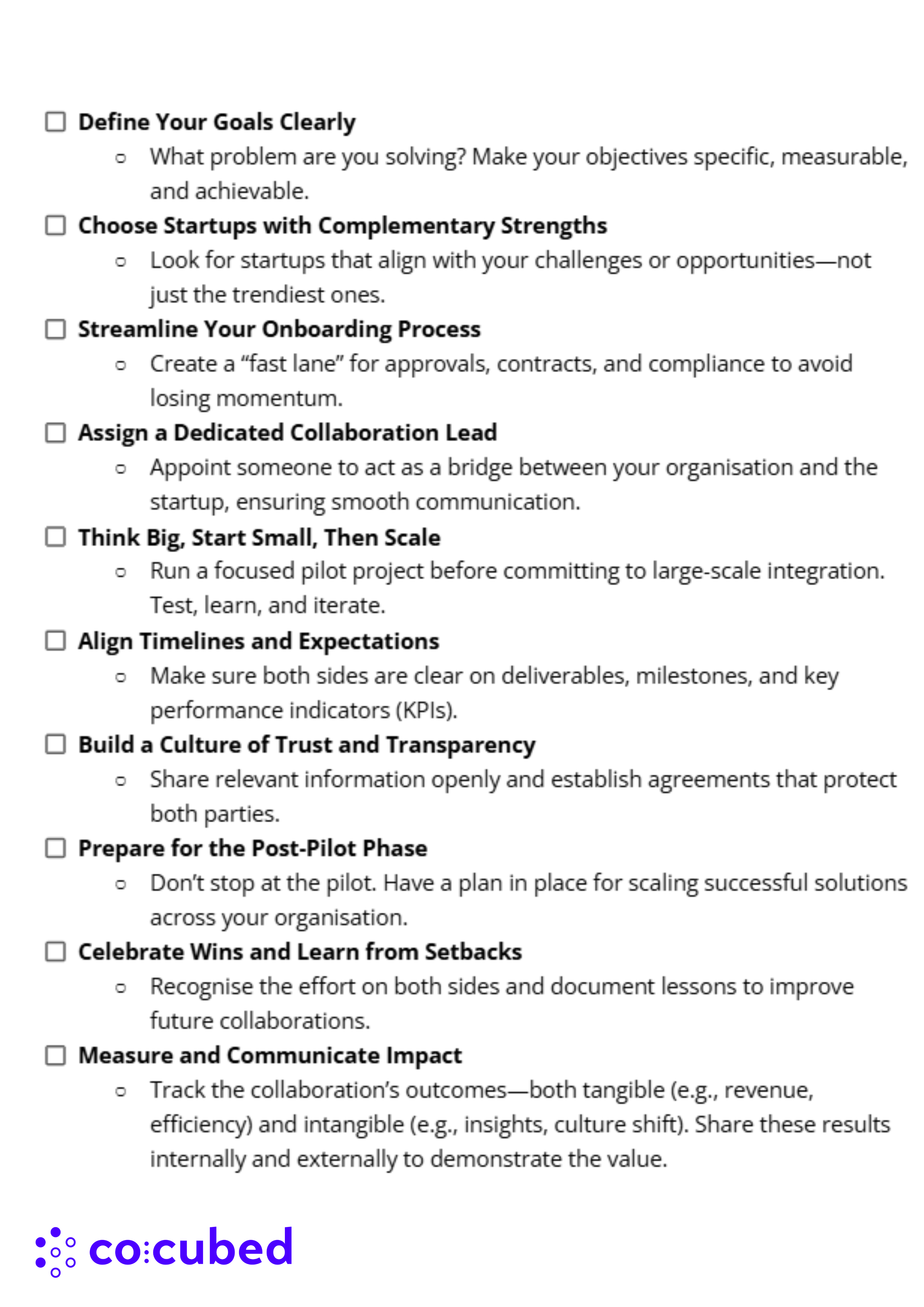Many corporates assume startup collaboration is straightforward: scout the right ones, sign a deal, and wait for the magic to happen. But the reality? Most collaborations fail to deliver their full potential. Let’s break down what every corporate really needs to know to make these partnerships work.
1. It’s Not About Finding the “Next Big Thing”
Most corporates go into startup collaborations with the mindset of finding the next unicorn. While ambitious goals are great, successful collaborations start with solving specific problems, not chasing hype.
- Why It Matters: Startups thrive on focus, and corporates often overwhelm them with broad or unrealistic expectations. Aligning on tangible, measurable outcomes ensures a partnership that delivers value to both sides.
- What you could start with: Define one clear objective for the collaboration—whether it’s improving operational efficiency, testing a new market, or building a prototype. Start small and scale once there’s evidence of success.
2. Speed Wins Over Perfection
Corporates are used to robust processes and lengthy decision cycles. Startups? They move fast, and waiting too long can mean missing the window for innovation.
- Why It Matters: Startups can pivot quickly, often reshaping their business model to adapt to market needs. If a corporate takes too long to respond, the startup may no longer be offering what the corporate initially sought—or they may have moved on to a more responsive partner. The result? Missed opportunities for both sides.
- What you could start with: Streamline your internal processes for working with startups. Create a “fast lane” for approvals, pilot projects, and feedback cycles to match their speed.
3. Power Dynamics Can Kill Innovation
It’s easy for corporates to overshadow startups in a collaboration. Unequal relationships—where corporates dictate terms and limit the startup’s autonomy—often stifle creativity and innovation.
- Why It Matters: Startups bring fresh thinking precisely because they operate differently. Over-controlling their approach removes the very value they bring.
- What you could start with: Approach partnerships as equals. Build agreements that protect the startup’s independence while aligning on mutual goals. Be transparent about risks, timelines, and expectations upfront.
4. Culture Clash Is Real
Startups and corporates are worlds apart in how they work. Startups embrace agility, risk, and experimentation. Corporates lean on structure, process, and predictability. Bridging this gap is essential.
- Why It Matters: If left unchecked, cultural differences can derail even the most promising collaboration.
- What you could start with: Educate your internal teams on startup culture. Appoint a “startup liaison” within your company—someone who understands both worlds and can act as a bridge.
5. Collaboration Doesn’t End After the Pilot
Most corporates run pilots with startups, but many fail to scale these solutions into meaningful impact across the business.
- Why It Matters: A successful pilot is only the first step. Without a clear path to scaling, the collaboration risks becoming a one-off experiment rather than a transformative initiative.
- What you could start with: Plan for scale from the start. Identify internal stakeholders, budget, and resources needed to roll out successful pilots company-wide.
6. Diversity Drives Better Outcomes
Startups bring diversity not only in terms of their solutions but also in their approaches, ideas, and ways of thinking. Collaborating with them is a chance to inject fresh perspectives into your organisation.
- Why It Matters: Diverse thinking often leads to breakthrough innovation, but it requires openness to new ideas and ways of working.
- What you could start with: Don’t just collaborate with startups in your industry. Explore cross-sector partnerships where you can learn from completely different business models and technologies.
Build Relationships, Not Transactions
Startup collaboration isn’t just a box to tick—it’s a long-term strategy for staying competitive and relevant. The best partnerships are built on trust, shared goals, and a willingness to adapt. By approaching startups with the right mindset and processes, corporates can unlock a world of opportunities they never imagined.
Ready to rethink how your organisation collaborates with startups? Check out our collaboration checklist below:
Startup Collaboration Checklist:
10 Steps to Success
Use this checklist to ensure your startup collaborations are set up for success:



